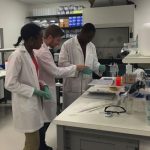
By Lauren Weathington
nicholsonstudentmedia.com
It’s a quiet day on the fourth floor of the Research Pavilion building in UCF’s Research Park… or so it seems. At second glance, the halls are abuzz with professors and students dressed alike in lab coats speaking a language unknown to most commoners: the language of science.
In Room 422, the nanotechnology program coordinator, Qun Huo, sits at her desk in front of a large window displaying a nearly setting sun. Her desk is organized and the large bookshelf in front of her consists of many bulky books with the word “chemistry” in their title. After a long day of reviewing the program and teaching courses, Huo finishes her day around 6 p.m.
“Nanotechnology is a very fast growing field,” says Huo “Companies are very interested in people who have been trained in nanoscience.”
Nanotechnology involves the study of extremely small particles, ranging in size from 1 to 100 nanometers (1 nanometer is one-billionth of a meter), that make up all matter. Basically, nanotechnology studies things on a very small scale to understand why matter behaves the way it does on a large scale. Nanotechnology is interdisciplinary and is used in engineering, biology, chemistry, and many other fields.
“All of my students who are in the nanotechnology program have their own independent research projects, which integrate highly interdisciplinary approaches including biophysics, biochemistry, and bioengineering techniques,” says assistant professor, Hyeran Kang.
At UCF, there are two slightly different nanotechnology programs. One is the Nanotechnology Professional Science Master’s (PSM) and the other is the Master of Science in Nanotechnology program (MS). The biggest difference is that the PSM program integrates more business courses in the curriculum. These programs began in 2014 and have 30 students in the two programs.
UCF was the first college in Florida to offer a nanotechnology degree.
“Communication across the discipline is becoming more and more important, which brought a very interesting education opportunity,” Huo said “We wanted to create an environment and education place where students can get used to the interdisciplinary nature.”
The professors in the program are trained in different subjects, some in chemistry, some in biology, and others in physics.
Huo works tirelessly reviewing the program to improve it, as the program coordinator. She was trained as a chemist in China, and then received her doctorate degree from the University of Miami. When she is not working on reviewing the nanotechnology program, she is doing her own research in nanoscience. Huo recently published a paper on gold nanoparticles being used in cancer detection.
“The bottom line is that we want our students to become competitive,” said Dr. Huo.
The program was designed to give undergraduate students the chance to continue their education and have a chance to get valuable research experience. Huo said that the purpose of the nanotechnology program is to teach students about cutting-edge science and to give students an opportunity to work in a lab setting.
Discussing the program, nanotechnology student Jennifer Parra said, “It encompasses everything, just on a smaller scale.”
Parra worked as a microbiologist for a local pharmaceutical company for over two years after graduating with her bachelor’s degree in molecular and microbiology from UCF in 2011. She was interested in going back to school when she received an email from Huo about the new nanotechnology program starting at UCF.
“I was intrigued by the name, I had no idea what nanotechnology was,” said Parra.
Parra is graduating in May from the program with her Master’s degree, but this isn’t the first of her impressive accomplishments.
In the summer of 2015, Parra had an internship with L’Oréal, the world’s largest cosmetics company. Parra spent her time with L’Oréal developing an in-house method for diagnosing damaged hair. The old method in place took a week to implement, but Parra and the other interns had to shrink this process down to just one day.
After the internship Parra was offered a job with L’Oréal, but accepted another offer from Accenture, a leading consulting company.
“I can switch industries because nanotechnology is so broad.” Parra said.
Parra said that the nanotechnology program gave her experience that prepared her for the internship and to enter the work force. She added that the program helped to give her an edge over other interns from elite schools, like MIT and Columbia University.
“Nanotechnology is truly the next frontier of science,” said Parra, “It’s now and tomorrow.”
Pictured: Students Taylor Wood, Nicholas Castaneda and Montherson Saint-Juste working in the lab.